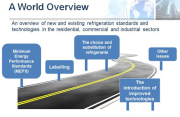The first phase of a study carried out by BSRIA for the Saudi Ministry of Water and Electricity has been successfully completed.
 The first phase of a study carried out by BSRIA for the Saudi Ministry of Water and Electricity has been successfully completed.
The first phase of a study carried out by BSRIA for the Saudi Ministry of Water and Electricity has been successfully completed.
Working closely with Saudi Arabia agency AMAD, the in-depth study looked at the country’s domestic, commercial and industrial refrigeration market. A key finding revealed that it is likely that major efficiency gains can be achieved.
Saudi Arabia is one of the world’s largest markets in the volume of imports. Each year, it receives huge quantities of refrigeration and freezing products from all over the world. Many imports are not subject to quality checks and some products manufactured locally are being sold directly into the market without satisfying any standards.
The Ministry of Water and Electricity is tasked to achieve the best services in the electricity sector and wants to provide better protection for electricity users, achieving optimal use of energy. As such, the Ministry is looking at the bad influence of low efficiency appliances in the refrigeration sector to help avoid the load increasing in the electric network throughout the year.
BSRIA’s aim was to filter the best global products and solutions to achieve the best result for Saudi Arabia. The association was able to draw on its own experience from its World Refrigeration Reports that focus on the market for commercial and industrial refrigeration in nine key countries: China, Brazil, France, Germany, India, Italy, Russia, the UK and the USA, and also took views from International trade bodies and associations in the refrigeration sector. In addition, it set up a panel of experts from major global players especially in Europe and the USA.
BSRIA/AMAD also analysed global and local legislations for refrigeration to get the best for Saudi. A high level of importance is placed on safety and environmental issues with particular emphasis on the reduction of water and electricity.
Key areas include (individual products may change following the initial evaluation):
1. Domestic refrigeration: fridges, freezers and fridge freezers.
2. Commercial refrigeration: integral cabinets, remote cabinets, medical cabinets, vending machines and water coolers, walk in cold rooms and cold stores.
3. Industrial refrigeration: distribution warehouses, process chillers (including for oil and gas).
Hugh Brenchley (pictured), senior researcher, WMI, at BSRIA, said: “Key findings are that, while the efficiency of a lot of household refrigerators currently on the market in Saudi Arabia compares favourably with the rest of the world, there is still room for improvement especially for low cost products at the lower end of the efficiency scale. The picture for commercial refrigeration products is more complex due to the variety of configurations and bespoke products, some of which are manufactured in the Kingdom. Nevertheless, it is very likely that major efficiency gains can be achieved.”
Hugh continued: “Some minimum energy performance standards (MEPS) in the domestic sector need to be recalibrated to support the better quality products already available in the market. In the commercial sector there is minimal regulation and a strong argument for introducing MEPS. The impact of revised MEPS for the domestic sector and new MEPS for the commercial sector including whether to adopt US or European standards will be considered in the next stages of the project. All in all, the client was very happy with the work carried out so far.”
The choice of refrigerants and the substitution of refrigerants is also becoming important in investment decisions.
A summary report will be published at the end of the project – outlining the introduction of more efficient technologies and solutions that are well adapted to local conditions. They will cover:
• support for research and development to create new products or their components;
• designing (or revising) energy-test methods to reflect and accommodate technical innovation;
• organising buyer demand to expand the market for available high-performing products; and
• encouraging and incentivising manufacturers to introduce new products.
For anyone interested in the latest trends in domestic, commercial and industrial refrigeration, particularly in the Middle East and in minimum energy performance standards and labelling requirements for refrigeration products, contact Hugh Brenchley on 01344 465527, 07702 246062 or email hughbrenchley@bsria.co.uk.